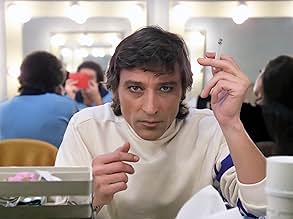I am drawn to dance films, first for the dance itself, I marvel at how the human body can turn itself into visual music. But also for what dance can signify in a cinematic sense: the embodying of sense in form, the visual flow of consciousness, but where the camera is one of the dancers and wordlessly conveys whole essences in the space of what we see.
Here, I like the idea of centering the dance in the ordinary life that gives rise to it, so in the same flow we can pick up both improvised life and meticulous abstraction. We get the gathering of the troupe and preparations, the putting on of make-up and dressing-room small talk, the practice and rehearsal with its mistakes, and then a full dress rehearsal of the play instead of a big show.
My gripe is that so much more could've been made on the weaving of realities. We have a 'real' first half, but we're not immersed long enough to form connections. The feel like we are eavesdropping could be carried in the actual danced narrative, which is about secrets and watching. The energy and choreographed spillovers in the camera could be more rigorous, the flamenco more passionate. Imagine a mistake in the flow like in the first rehearsal, but they dance through it: how do we accommodate damage, chance, spontaneity?
As it is, there's too much theatric symmetry for me to like—not enough that is broken or alive. But at least the last scene is pretty amazing.
It's a knife fight between men for the eyes of the woman danced in slow-motion—the mirrored poise and grappling of pride mistaken as love, the arrested flow playing to the desired spectacle of manhood both by us and in the play, the ballet of camera singling again and again the knife, the woman's muted mimicked and impotent horror of watching. It's a lovely scene that I'll keep with me, a sort of visual carving in emotional time.























